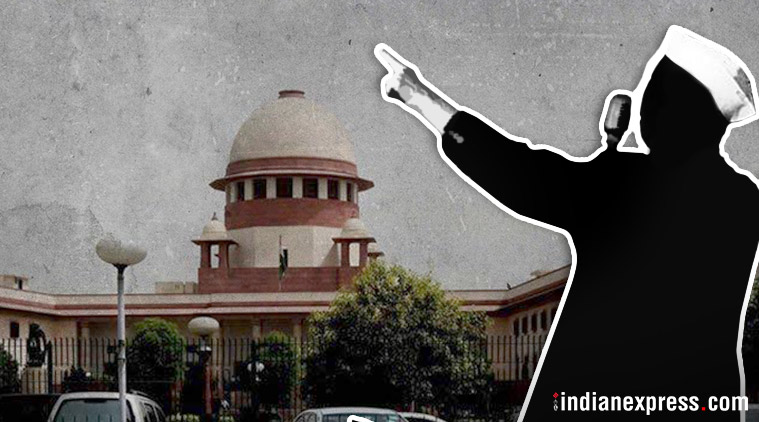 The Supreme Court on Tuesday left the issue of keeping criminals out of the electoral process to Parliament.
The Supreme Court on Tuesday left the issue of keeping criminals out of the electoral process to Parliament.
The Supreme Court Tuesday asked Parliament to enact a law to ensure candidates facing criminal cases do not contest elections. The issue of ushering in electoral reforms – including barring candidates with criminal antecedents from contesting in elections – was referred to the Law Commission of India in 2013. Minister of State for Law and Justice and Corporate Affairs, P P Chaudhary, in reply to a question in Lok Sabha on February 7, 2018, stated that the Law Commission had submitted its 244th report ‘Electoral Disqualifications’ and its recommendations were under examination.
The commission headed by Justice (retd) A P Shah submitted its recommendations in 2014 after receiving responses from various stakeholders to the question: “Whether disqualification should be triggered upon conviction as it exists today or upon framing of charges by the court or upon the presentation of the report by the Investigating Officer under Section 173 of the Code of Criminal Procedure?”
READ | SC asks Parliament to keep ‘criminal’ lawmakers away: Five things to know about the order
What are the Law Commission recommendations?
The commission observed that disqualification upon conviction in a criminal case has “proved to be incapable of curbing the growing criminalisation of politics”. This owing to prolonged trials in court and lower conviction rate. “The law needs to evolve to pose an effective deterrence, and to prevent subversion of the process of justice,” it said.
At the same time, it did not recommend electoral disqualification at the stage of police filing a report under Section 173 of the Code of Criminal Procedure. What it did recommend was that disqualification can be triggered at the stage of framing of charges by a court.
“If accompanied by substantial attendant legal safeguards to prevent misuse, has significant potential in curbing the spread of criminalisation of politics,” the commission observed.
Owing to the potential misuse of this provision, the commission recommended the following safeguards:
1. Only offences which have a maximum punishment of five years or above ought to be included within the remit of this provision.
2. Charges filed up to one year before the date of scrutiny of nominations for an election will not lead to disqualification.
3. The disqualification will operate till an acquittal by the trial court, or for a period of six years, whichever is earlier.
4. For charges framed against sitting MPs/ MLAs, the trials must be expedited so that they are conducted on a day-to-day basis and concluded within a 1-year period. If trial not concluded within a one year period then one of the following consequences ought to ensure:
# The MP/ MLA may be disqualified at the expiry of the one-year period; OR
# The MP/ MLA’sright to vote in the House as a member, remuneration and other perquisites attaching to their office shall be suspended at the expiry of the one-year period.
How many lawmakers face criminal cases in India?
In March this year, the government told the Supreme Court that 3,045 criminal cases involving 1,765 MPs and MLAs are pending in various states across the country. Uttar Pradesh, followed by Tamil Nadu and Bihar, have the most number of lawmakers facing criminal charges, according to the affidavit submitted by the Law Ministry.
There are 248 MPs and MLAs in Uttar Pradesh facing 539 cases, 178 lawmakers in Tamil Nadu are facing 324 cases, and 144 of them are facing 306 cases in Bihar.
The data collected by the ministry from various courts corresponds to the period between 2014-2017. Maharashtra and Goa are yet to submit their reports. The Centre proposed to set up 12 special courts to try the cases and allocate Rs 7.8 crore in total, which amounts to Rs 65 lakh for each court.
This includes two special courts for trying cases against MPs and one each in Andhra Pradesh, Karnataka, Kerala, Madhya Pradesh, Maharashtra, Tamil Nadu, Telangana, Uttar Pradesh, Bihar and West Bengal.
What did the Supreme Court propose?
The apex court today directed all candidates to declare details of criminal cases pending against them, in bold, in their election affidavit. Political parties fielding candidates with criminal antecedents must publish their details on their party websites and also widely circulate it in the media.
This should be done at least three times after candidates file their nomination papers, the court said.